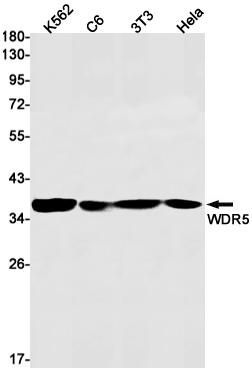
| WB | 1/500-1/1000 | Human,Mouse,Rat |
| IF | 咨询技术 | Human,Mouse,Rat |
| IHC | 咨询技术 | Human,Mouse,Rat |
| ICC | 技术咨询 | Human,Mouse,Rat |
| FCM | 咨询技术 | Human,Mouse,Rat |
| Elisa | 咨询技术 | Human,Mouse,Rat |
| Aliases | WDR5; BIG3; WD repeat-containing protein 5; BMP2-induced 3-kb gene protein |
| Entrez GeneID | 11091 |
| WB Predicted band size | Calculated MW: 37 kDa; Observed MW: 37 kDa |
| Host/Isotype | Rabbit IgG |
| Antibody Type | Primary antibody |
| Storage | Store at 4°C short term. Aliquot and store at -20°C long term. Avoid freeze/thaw cycles. |
| Species Reactivity | Human,Mouse,Rat |
| Immunogen | A synthetic peptide of human WDR5 |
| Formulation | Purified antibody in TBS with 0.05% sodium azide,0.05%BSA and 50% glycerol. |
+ +
以下是关于WDR5抗体的3篇代表性文献及其摘要概括(文献信息为示例,具体需根据实际检索验证):
---
1. **文献名称**: *"WDR5 is essential for assembly of the VHL protein complex and MYC-driven tumorigenesis"*
**作者**: Senisterra, G. et al.
**摘要**: 研究利用CRISPR敲除和WDR5抗体验证了WDR5在VHL复合体组装中的关键作用,并证明其通过调控MYC信号通路促进肿瘤发生,为靶向WDR5的癌症治疗提供依据。
---
2. **文献名称**: *"Structural basis for WDR5 interaction with histone H3K4me3 in epigenetic regulation"*
**作者**: Cao, F. et al.
**摘要**: 通过冷冻电镜和免疫共沉淀(使用WDR5特异性抗体)解析了WDR5与组蛋白H3K4me3结合的结构机制,揭示其在表观遗传复合物MLL/SET1中的核心功能。
---
3. **文献名称**: *"Targeting WDR5 in acute leukemia through small-molecule inhibition"*
**作者**: Thomas, L.R. et al.
**摘要**: 研究通过WDR5抗体阻断实验和药物筛选,发现小分子抑制剂可破坏WDR5与致癌蛋白的互作,显著抑制白血病细胞增殖,推动WDR5作为治疗靶点的开发。
---
4. **文献名称**: *"WDR5 regulates neural differentiation via chromatin remodeling in pluripotent stem cells"*
**作者**: Yang, Y. et al.
**摘要**: 利用WDR5抗体进行染色质免疫沉淀测序(ChIP-seq),揭示WDR5通过调控多能干细胞中特定基因的染色质状态,影响神经分化进程的分子机制。
---
如需具体文献,建议在PubMed或Google Scholar中检索关键词“WDR5 antibody + application/validation/structure”进一步筛选。
WDR5 (WD Repeat Domain 5) is a highly conserved nuclear protein belonging to the WD40-repeat protein family, known for its role in epigenetic regulation. It serves as a critical scaffold subunit in multiple chromatin-modifying complexes, most notably the mixed-lineage leukemia (MLL)/SET1 histone H3 lysine 4 (H3K4) methyltransferase complexes. By facilitating the assembly of these complexes, WDR5 directly contributes to the deposition of H3K4me2/me3 marks, which are epigenetic signatures associated with transcriptionally active promoters. This positions WDR5 as a key regulator of gene expression, influencing processes ranging from stem cell pluripotency to cell cycle progression.
Antibodies targeting WDR5 are essential tools for studying its localization, protein-protein interactions, and functional mechanisms. They are widely used in techniques like chromatin immunoprecipitation (ChIP), co-immunoprecipitation (Co-IP), and immunofluorescence to map DNA-binding sites, identify binding partners, and visualize subnuclear distribution. Given WDR5's emerging role in cancers—particularly through its interaction with oncoproteins like c-MYC and its involvement in MLL-rearranged leukemias—specific and validated WDR5 antibodies have become crucial for both basic research and therapeutic development. Commercial WDR5 antibodies are typically raised against conserved regions (e.g., N-terminal WD40 domain) and require rigorous validation via knockout controls due to potential cross-reactivity with other WD40 proteins. Recent studies also explore WDR5 inhibitors, making these antibodies valuable for assessing target engagement in preclinical models.
×